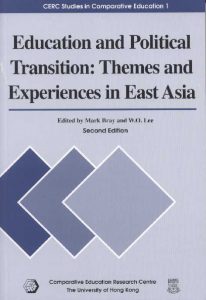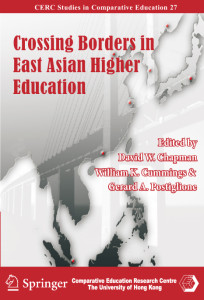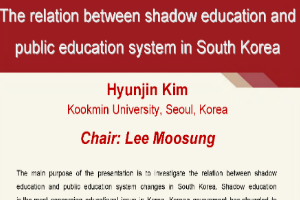Return to the CERC Studies in Comparative Education.
 Edited by: Mark Bray & W.O. Lee
Edited by: Mark Bray & W.O. Lee
2001 2nd edition, 228pp
ISBN 10: 962-8093-84-3
ISBN 13: 978-962-8093-84-7
HK$200 (local), US$32 (overseas)
Published by the Comparative Education Research Centre (CERC)
Buy online
Preview on Google Books.
This book is the second edition of a volume published in 1997. Substantially revised and expanded, it throws new light on the links between education and political transition in a dynamic part of the world. Themes addressed by the book include globalisation, internationalisation and localisation; democratisation and nationalisation; colonial and postcolonial transitions; and liberal versus democratic approaches. Individual chapters focus on mainland China, Hong Kong, Korea, Macau, Mongolia, Singapore and Taiwan.
Reviewing the first edition, Philip Altbach commented in the Asia Pacific Journal of Education (Vol.18, No.2) that “these are very worthwhile essays that add significantly to our knowledge of … the region”. Readers will find the second edition an even stronger contribution to the field.
Mark Bray is Director of the Comparative Education Research Centre at the University of Hong Kong. He is also Secretary General of the World Council of Comparative Education Societies. W.O. Lee is Dean of the School of Foundations in Education at the Hong Kong Institute of Education. Prior to taking this position, he was Director of the Comparative Education Research Centre at the University of Hong Kong. Both editors are past Presidents of the Comparative Education Society of Hong Kong; and both have published extensively in the field of comparative education.
Contents
Introduction
- Education and Political Transitions in East Asia: Diversity and Commonality (Mark BRAY & W.O. LEE)
Globalisation, Internationalisation and Localisation
- Globalisation, the State and Education Policy in Singapore (Saravanan GOPINATHAN)
- The Taiwanisation, Democratisation and Internationalisation of Higher Education in Taiwan (LAW Wing Wah)
- Political Transitions and the Internationalisation of English: Implications for Language Planning, Policy-making and Pedagogy (Robert Keith JOHNSON)
Democratisation and Nationalisation
- Democracy, Education and Reform in Mongolia: Transition to a New Order (Malcolm INNES-BROWN)
- Controversies in Hong Kong’s Political Transition: Nationalism versus Liberalism (W.O. LEE & Anthony SWEETING)
Colonial and Postcolonial Transitions
- Education and Political Change in Korea: Colonial, Post-Colonial, Authoritarian and
- Democratic Transitions (LEE Yonghwan)
- Higher Education and Colonial Transition in Macau: Market Forces and State Intervention in a Small Society (Mark BRAY)
- Education, Civic Participation and Identity: Continuity and Change in Hong Kong (Paul MORRIS, Flora KAN & Esther MORRIS)
Liberal versus Traditional Approaches
- Regulating Pedagogic Discourse: in China: The Shift between Restrictive and Elaborated Ideological Orientations (CHEUNG Kwok Wah)
- Moral Education Policy in China: The Struggle between Liberal and Traditional Approaches (W.O. LEE)


 Edited by David W. Chapman, William K. Cummings & Gerard A. Postiglione
Edited by David W. Chapman, William K. Cummings & Gerard A. Postiglione










